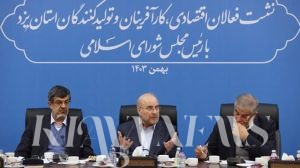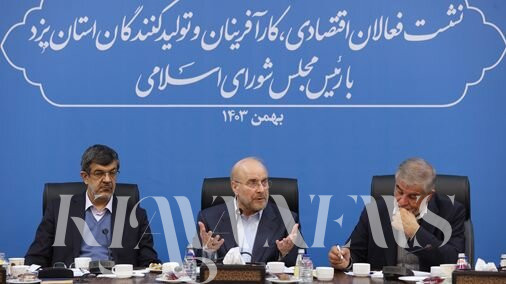YAZD, IRAN – Speaker of the Iranian Parliament, Mohammad Bagher Ghalibaf, emphasized that inflation cannot be controlled by injecting foreign currency or relying on cheap imports. He made these remarks during a meeting with business leaders, entrepreneurs, and producers in Yazd on Friday, February 2, 2025.

Ghalibaf Criticizes Economic Management Approach
During his speech, Ghalibaf criticized both the private sector and government policies, stating that the lack of effective dialogue and problem-solving mechanisms has contributed to the current economic challenges.
📌 Key Points from His Speech:
- Economic discussions often focus on listing problems rather than finding solutions.
- Complex regulations and multi-tiered currency rates are causing corruption and inefficiencies in the economy.
- Government should focus on facilitating and regulating rather than directly managing economic growth.
- The private sector must take a leading role in economic development.
Call for Policy Reform and Structural Changes
Ghalibaf highlighted the shortcomings of Iran’s privatization efforts, revealing that only 11% of state-owned enterprises were transferred to the private sector, while the rest remained under government control.
📌 Proposed Policy Changes:
- Public companies under pension funds must be listed on the stock exchange within two years or handed over to the private sector.
- Regulations on business licensing must be streamlined, ensuring approvals are granted within three months.
- Economic driving forces such as energy, industry, and mining require semi-annual reviews for better planning.
- Reduction of legal complexities by cutting down 12,000 laws to 3,500 for clarity and efficiency.
Inflation, Currency Rates, and Import Policies
Ghalibaf pointed out that currency injections and cheap imports have led to multi-tiered exchange rates, which in turn create corruption and disrupt economic stability.
📌 Challenges Identified:
- Discrepancies in foreign exchange policies lead to manipulation and fraud.
- Imports of industrial machinery have been legalized, but implementation remains slow.
- Contradictions in trade policies have caused inefficiencies in the automotive sector, where billions of dollars are allocated for parts instead of full vehicle imports.
Encouraging Private Sector Growth
Ghalibaf urged private businesses to actively engage in economic reforms, stating that they should not merely expect government intervention but propose actionable solutions.
📌 Private Sector Priorities:
- Business leaders must drive investment and innovation.
- Yazd should set an example in empowering the private sector.
- Economic policies should be revised based on long-term planning (minimum 10-year horizon).
Addressing Industry and Investment Challenges
Entrepreneurs and business leaders raised several concerns, including:
✅ The need for simplified import regulations for raw materials and machinery.
✅ Lack of access to bank loans and excessive bureaucratic hurdles in the private sector.
✅ Review of energy policies and promoting solar energy solutions for agriculture.
✅ Expansion of the Yazd Science and Technology Park to foster startup growth.
✅ Tax incentives for cooperatives and innovative businesses.
Ghalibaf reaffirmed Parliament’s commitment to resolving these issues and called for continuous dialogue between policymakers and business leaders.



